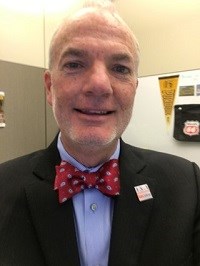
There is no such thing as a typical work day for Tim Goedeker. In addition to being part of Phillips 66’s corporate Health, Safety & Environmental organization (HSE), which supports the refining business unit, Tim works with the refining environmental leadership team to ensure permit standards are upheld and satisfied. A standard day can therefore vary drastically depending on the organization’s current needs.
To begin his day, Tim spends time reviewing the organization’s ongoing operations. This entails making sure that all the sites are in compliance with their environmental operating limits as well as following the proper steps to investigate and develop corrective actions, if an environmental non-compliance issue should arise. Tim also spends a part of his day assisting the refineries in implementing new United States Environmental Protection Agency (USEPA) rules. More specifically, Tim will monitor the progress of implementation at the various sites, as well as answer questions, share lessons learned from industry peers and provide clarification about newly approved rules.
“That is one of my biggest responsibilities, working with the sites,” Tim explained. “We have 11 refineries in the US and one in the UK. I work with all of the environmental leads and their teams to ensure all are stewarding to improve our practices and processes, and we are complying with ever-increasing regulations.
Engaging with Subject Matter Experts (SME) monthly by teleconference is another important part of Tim’s role. As there are approximately 8 internal networks which touch on most environmental aspects at each site, leading a number of SMEs to discuss the best practices, reflect on past incidents and near misses and create a flow of knowledge across sites, is an essential daily task. “We are not perfect,” Tim states. “But what keeps me excited about this role is that we strive to continuously improve which is demonstrated by year to year improvements for the last decade. We must continue thinking outside the box and auditing the improvements we have made in order to sustain them. This is how we ensure lessons learned are maintained through transition periods from one engineer to the next. Our goal is best in class environmental performance.”

The Challenge of Containing Fugitive Emissions
As someone heavily involved in the refining industry, Tim provided valuable insight into some of the challenges the industry faces in managing fugitive emissions and their impact on the environment.
One of the areas he discussed, in detail, was the impact continual reduction in allowable fugitives limits have on a valve’s effectiveness to contain emissions. While most valves meet the current requirements, those requirements are being reduced. Tim explained that, as fugitive emission limits are lowered the quality of valve and packing technology will ultimately have to improve. Although currently, these standards are only applied to specific valve types, Tim suggests that once the technology evolves to get a lower leak rate on traditional gate and globe valves, the expectations will extend to regulators and other components, so fugitives can be reduced in those areas as well.
The Necessity of Networking
Early on in his career, Tim realized that he had a passion for working with individuals from a variety of different sectors in the industry. The most rewarding aspect of his job, Tim says, is working with the ~100 environmental professionals across all Phillips 66 refineries. While he does not know all the new faces, he says he is on a first name basis with the majority of them. The ability to interface with such a dynamic group of professionals provides him with the opportunity to not only collaborate and work together on new ideas, but to learn from their unique perspectives. “I am not a SME,” Tim stated, “my role is not to dictate how everything should be done, I do not have the same experiences as many of the people in the plant. My role is to ensure that we are all networking, sharing lessons, and continually improving, which is the most rewarding part.”
Tim believes that building and maintaining good relationships is extremely important in business and networking. The relationships that develop through mentoring and ongoing interactions with a variety of industry professionals is paramount to the successful progression of reducing fugitive emissions. For Tim, events such as the Valve World Americas conference, are therefore very important.
“We do not have enough time in our work day to network and talk to people face-to face, so continuing the yearly summit is important. At the summit we have time to get to meet our peers and talk about what is going on and potentially learn something new. We must continue to have these types of conferences to spur on new ideas and innovation.”

Inspiring Innovation at Valve World Americas
As chairman of Valve World Americas 2019, Tim hopes to provide attendees with the opportunity to get excited about valve technology. “A valve is not just there to open and close, or start and stop, process material. There are leaks and emissions that come from these components, and I believe it is important for environmental professionals to be exposed to the present technology,” Tim stated. “With a higher level of understanding, more individuals will be able to effectively work towards reducing the overall fugitive emission footprint.” He believes that the event is the ideal venue for individuals to come together and see what else can be accomplished in the valve community. “These conferences help us to work on expanding and realizing the value of others’ experience while providing a venue of support for everyone to continue pushing towards a common goal.”





